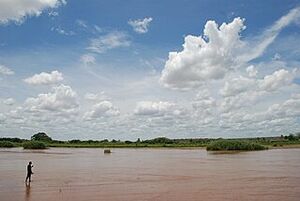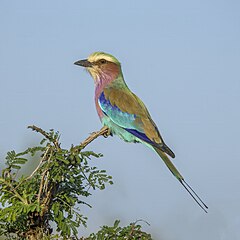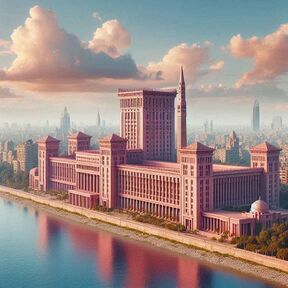New Rhoyne
This article is incomplete because it is pending further input from participants, or it is a work-in-progress by one author. Please comment on this article's talk page to share your input, comments and questions. Note: To contribute to this article, you may need to seek help from the author(s) of this page. |
The Republican Federation of New Rhoyne | |
|---|---|
| Motto: Unbowed, Unbent, Unbroken | |
| Anthem: Tears of Our Mother Rhoyne | |
| Location of New Rhoyne in Krystar. Location of New Rhoyne in Krystar. | |
| Capital | Chroynae |
| Largest city | Chroyane |
| Official languages | English, Rhoynish, Assani |
| Demonym(s) | Rhoynish |
| Government | Democratic Republican Federation |
• High Prince | Aran Uller |
• Seneschal | Dayana Grace |
| Legislature | The Republican Diet |
| Hall of the Elders | |
| Hall of the People | |
| Establishment | TBA |
| Area | |
• Total | 778,000 km2 (300,000 sq mi) (TBA) |
| Population | |
• 2087 estimate | 49.5 million (TBA) |
| GDP (PPP) | 2087 estimate |
• Total | $600 billion |
| Currency | Rhoynish Sundrop (RSD) |
| Date format | dd-mm-yyyy |
| Driving side | right |
| Calling code | +7 |
| Internet TLD | .nr |
Website newrhoynegov.nr | |
The Republican Federation of New Rhoyne, often simply referred to as New Rhoyne, is a nation located in southwestern Orrasia, situated between the Lake Rhoyne and the sea. With a population of 49.5 million people, it is one of the most populous countries in Orrasia.
New Rhoyne is a democratic republican federation composed of various city-states. Chroyane, the capital of the federation, is home to the government offices and is also the country's largest city, principal port, and leading commercial centre. Ny Sar, Sar Mell, Ay Nor, Ghoyan Drohe, and Sarhoy are some of the other major Rhoynish cities.
New Rhoyne owes its existence and prosperity to the great river and lake system known collectively as Mother Rhoyne. This vast body of water, comprising a giant lake and a river flowing from the lake to the sea, is the lifeblood of the nation, supporting its ecosystems, cities, and economy. New Rhoyne is an emerging market and economy and a rapidly industrializing country, whose economy is transitioning from being agricultural to service- and manufacturing-centered.
Etymology
The English name "Rhoyne" is derived from the Ancient Rhoynish "Rhoyana" ("ໂຣຢານາ"), which meant "Great Flow" or "Lifegiver." The name likely referred to the Rhoyne River, reflecting the river's crucial role in sustaining the early communities of the Tsuarian and Coysian people, facilitating trade and transportation. Over centuries, the term "Rhoyan" became synonymous not only with the river itself but also with the fertile lands and the people who lived along its banks.
During the Great Republican Revolution, the 1965 Lakeside Congress at Ghoyan Drohe proclaimed that a "New Rhoyne" will be established after the Rhoyne Empire is overthrown. The official title "Republican Federation of New Rhoyne" was included in the 1968 Constitution as the name of the future republican state, and in all succeeding constitutional revisions.
History
Pre-History
Ancient History
Medieval History
Modern History
Second Age Modern History
Geography
New Rhoyne is a country dominated by its extensive water system, primarily composed of Lake Rhoyne and the River Rhoyne, which flows centrally through the nation. The geography of New Rhoyne is intrinsically tied to these bodies of water, with much of the country's culture, economy, and settlements built around them. The River Rhoyne originates from Lake Rhoyne, a vast freshwater lake that serves as the heart of the nation's ecosystem. The river flows southward, eventually emptying into the X Ocean at the capital city, Chroyane.
Topography
The topography of New Rhoyne is characterized by extremely low elevations. The highest point in the country is Mount Selhar, standing at 1,200 feet (366 meters) above sea level. Other elevated regions include the Serren Hills, which reach up to 700 feet (213 meters), and the Doostin Plains, averaging around 500 feet (152 meters). However, the majority of the population resides in areas with elevations of 100 feet (30 meters) or less. The capital city, Chroyane, is situated at the river's mouth and lies just 13 feet (4 meters) above sea level, making it highly susceptible to seasonal flooding.
Climate
New Rhoyne experiences a tropical savanna climate, with distinct wet and dry seasons. The average temperature throughout the year is consistently hot, ranging from 30-31°C (86-88°F).
The wet season occurs from May to October, characterized by heavy rainfall, especially in the rainforest region near the river's emergence from Lake Rhoyne. This area receives the highest annual precipitation, averaging 1,200 mm. The rest of the country sees rainfall between 400-700 mm during this period, supporting the savanna biome. This season brings lush greenery but also risks of flooding in low-lying areas, particularly in Chroyane and other riverine cities like Ay Nor and Sar Mell.
The dry season spans from November to April, with significantly reduced rainfall and cooler evenings. During this time, water levels in the river and lake decrease, affecting agricultural practices and water availability. The savanna turns arid, and water scarcity becomes a pressing issue for both urban and rural areas.
Hydrology
The hydrology of New Rhoyne is dominated by the Lake Rhoyne and River Rhoyne system. These water bodies are vital for irrigation, transportation, and as a water source for both humans and wildlife. Seasonal variations in water levels significantly impact the surrounding ecosystems and agricultural cycles. The river's flow moderates the climate, bringing moisture and supporting the rich biodiversity along its banks. However, during the dry season, water scarcity can become a critical issue, affecting agriculture and drinking water supplies.
Environmental Concerns
New Rhoyne, as a developing country, faces several environmental challenges. Managing water resources is a significant concern, especially during the dry season when water scarcity can become critical. Overuse and pollution of the river and lake threaten the sustainability of these vital water sources. In the rainforest region, deforestation due to logging and agricultural expansion poses a severe threat to biodiversity. Loss of forest cover has lead to soil erosion, loss of habitat, and a decline in species populations.
Most cities in New Rhoyne are built around the river, leading to increased pollution and habitat destruction. Urban expansion, especially around Chroyane, contributes to the degradation of water quality and natural habitats. The low-lying nature of the country also makes it highly susceptible to seasonal flooding, particularly in the capital city and other areas close to the river and lake. Floods disrupt livelihoods, damage infrastructure, and exacerbate poverty. Overfishing, hunting, and habitat destruction threaten the country's rich biodiversity. Protecting key species, such as the culturally significant turtles, has required concerted conservation efforts.
Biodiversity
New Rhoyne boasts diverse ecosystems, ranging from savanna to tropical rainforests and seasonal forests, supporting a wide variety of species. The savanna biome covers most of New Rhoyne, characterized by grasses, acacia trees, and baobabs. This biome supports approximately 100 species of mammals, including antelopes, zebras, lions, and cheetahs. Birdlife is abundant, with over 200 species such as the secretary bird and the lilac-breasted roller which is considered to be the national bird of the country. Reptiles and insects also thrive in this biome.
The rainforest near the river's source is lush and vibrant, with dense vegetation, including mahogany and kapok trees. This region is home to over 500 plant species and numerous animal species, including 50 types of monkeys, 200 species of birds, and countless insects. The high precipitation supports a complex and interdependent ecosystem, making it a crucial area for biodiversity. Surrounding Lake Rhoyne, the tropical seasonal forest transitions between wet and dry periods. This area hosts around 300 plant species and diverse wildlife, including elephants, leopards, and a variety of amphibians and reptiles.
The River Rhoyne and Lake Rhoyne are teeming with aquatic life. There are over 100 species of fish, making the river a vital resource for local fisheries. The river is also home to numerous turtles, tortoises, and crocodiles. Turtles, in particular, hold great cultural and religious significance in New Rhoyne, with many local legends and festivals centered around them. The river and lake ecosystems are critical for maintaining the country's biodiversity.
Government and Politics
New Rhoyne is a republican federation of 9 city-states and a federal city-state, Chroyane. It is a representative democracy "in which majority rule is tempered by minority rights protected by law." The Constitution of New Rhoyne serves as the country's supreme legal document, also establishing the structure and responsibilities of the national federal government and its relationship with the individual city-states. The nomenclature of the government and political system of New Rhoyne is unique because, despite the country being completely democratic and republican, it uses names and titles of the older feudal princedoms and empires of the country.
Government
Composed of three branches, all headquartered in Chroyane, the federal government is the national government of New Rhoyne.
The three branches are:
- Executive: The High Prince is the head of state and head of government, and is the commander-in-chief of the armed forces. Elected by the people, the High Prince is by convention supported by the party or political alliance having a majority of seats in the lower house of the Diet. The executive of the Rhoynish government consists of the High Prince, the Seneschal (deputy High Prince), and the High Council - with the Small Council (cabinet) being its executive committee - headed by the High Prince. Any High/Small Councilor holding an Office (ministry) must be a member of one of the houses of the Diet. The High Prince and the Council serve five-year terms and may be reelected to the office only once, for one additional five-year term. In the Rhoynish parliamentary system, the executive is subordinate to the legislature; the High Prince and their Council are directly responsible to the lower house - the Hall of the People. Civil servants act as permanent executives and all decisions of the executive are implemented by them.
- Legislature: The Republican Diet, is the bicameral legislature of New Rhoyne, made up of the Hall of the Elders and the Hall of the People. The Hall of the Elders has 100 members elected at-large for a six-year term. The Hall of the People has 400 members, each elected for a five-year term; all representatives serve one legislative district of equivalent population.
- Judiciary: New Rhoyne has a three-tier unitary independent judiciary comprising the High Court of the Sun and Spear, headed by the Chief Justiciar, 10 State Courts, and a large number of trial courts. The High Court has original jurisdiction over cases involving fundamental rights and over disputes between city-states and the federal government and has appellate jurisdiction over the high courts. It has the power to both strike down federal or state laws which contravene the constitution and invalidate any government action it deems unconstitutional. The Chief Justiciar and the fourteen Associate Justices of the High Court are appointed by the High Prince from nominations submitted by the Order of the Bar. All judges are appointed for life.




